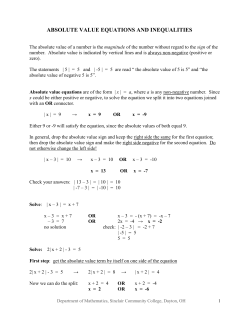
Education and Inequality
Education and Inequality Social stratification and educational inequalities Tarek Mostafa Institute of Education, University College London One of the major goals of modern social policy is to provide equal educational opportunities to the wider public. However, the prospect of equality of opportunity is hindered by social stratification and inequality. In this lecture, we are going to explore the mechanisms of educational stratification in a comparative framework between a large number of OECD countries. Widening the participation gap: the effect of educational track on political engagement Jan Germen Janmaat Institute of Education, University College London Inequalities in political participation are widely recognised to be problematic, as they make democratic government less responsive to the needs of the politically disengaged and thereby undermine the public legitimacy of liberal democracy. This seminar will assess the extent to which tracking contributes to these inequalities. Tracking is postulated to enhance the participation gap because of cross-track differences in the curriculum and in peer socialization. The results of two studies will be presented, which examine whether this predicted outcome can be observed among adolescents in England. The first study uses the Longitudinal Study of Young People in England (LSYPE), while the second is based on the Citizenship Education Longitudinal Study (CELS). The lessons will be held on Thursday, 7 May 2015, from 9:30 a.m. to 12:00 p.m. in classroom R241 (Prague 1, M. Rettigové 4, 2nd floor). Please confirm your participation to the following email: jaroslava.simonova@pedf.cuni.cz. Jan Germen Janmaat is Reader in Comparative Social Science at UCL Institute of Education, and leader of the theme 'Education, Inequality and Social Cohesion' within the Centre for Learning and Life Chances in Knowledge Economies and Societies (LLAKES). He is interested mainly in the sociopolitical outcomes of education and has published widely on this topic. In 2013 he was awarded a British Academy Mid-Career Fellowship for a project on education and civic attitudes using longitudinal data sources. The current seminar will present two pieces of research he conducted as part of this fellowship. Tarek Mostafa is an economist at University College London – Institute of Education. He is mainly interested in economic and social policy with a particular emphasis on the economics of education, educational inequalities, economic development and quantitative methods. He holds a PhD in Economics, Summa Cum Laude, from the University of Aix Marseille (France), and an MA in Political Economy from the Saint Joseph University (Lebanon). His research spans a number of areas: The analyses of educational inequalities in developed OECD countries and in North Africa, the assessment of educational performances and policy, and the development of quantitative methods. In addition to his research activities, he has taught on several courses, supervised postgraduate and PhD students and provided consultancy services to national and international organizations.
© Copyright 2025














